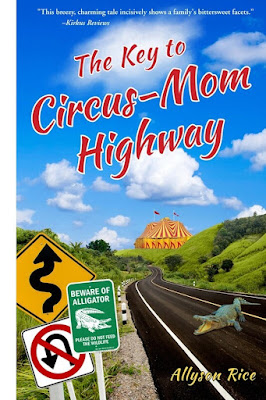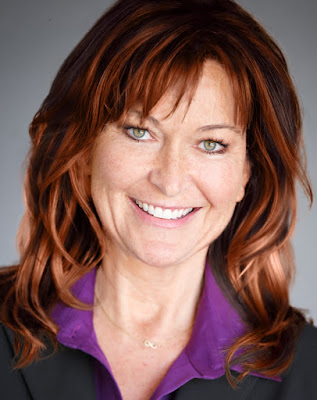This journey to becoming a published author has been a long and winding road, one with lots of stops along the way and many detours. Just like the road trip in The Key to Circus-Mom Highway!
No, writing was not a childhood dream. When I was in elementary school (around 3rd or 4th grade), I remember telling people I wanted to be either an archaeologist (obsessed with ancient Egypt), a horse trainer (obsessed with horses), or Secretary of State (I have no idea why, but it’s true!) Then when I was 12, I saw my friend Jill perform in a dinner theatre production of The Sound of Music, and I was sold. From that moment forward I pursued dancing/singing/acting as a career. That was the path I stayed on until I was in my mid-30s. I was fortunate to work consistently in the theatre, in commercials, and after college, when I lived in LA and NYC, on television.
Then I got tired of the entertainment industry and left it to spend the next decade running personal growth retreats around the country. When I burnt out doing that, I turned toward creative/artistic pursuits again, and that included writing this time around. I started by writing some spec scripts (TV pilots). I did that in collaboration with some other people, but when my dad urged me to try writing solo, that’s when I started writing novels. It is, by far, my favorite medium to write in now. There’s so much freedom in writing novels!
The Key to Circus-Mom Highway is your first novel. Where did the idea for this unique plot come from? For the main characters that inhabit it?
I was already writing a different novel, but then one night I re-watched an old movie from the 80s, After Hours. I loved the general premise that this guy was just trying to get home one night in NYC but kept getting waylaid, surrounded by strange characters everywhere in the late-night underbelly of the city. I decided I wanted to write something like that. A character trying to get from point A to point B, surrounded by odd, unfamiliar characters. It was a very general idea, but that was the seed of it. I put the other novel aside to write this one.
Then I just kept having to answer questions about who this person was, where she was trying to go, and why. It got fleshed out one tiny piece at a time. (That makes me think of the old joke: How do you eat an elephant? Answer: One bite at a time.) Invariably, as I answered a question or solved a problem, some new piece of the story would be added that would often dovetail with something else I had added previously. At a certain point, it felt like the story was writing itself.
Part of that is due to the fact that I really focus on character first. Then when something happens in the plot, the way the character responds helps to determine what happens next. I knew who Jesse was first, then Jennifer was added shortly thereafter and that sister dynamic got developed. But the character of Jack wasn’t added until one day when I asked myself, “What would take them by surprise at this point in the story?” And Jack was the answer to that question. Because I knew who Jesse was by that point, the dynamic between the two of them was the first thing to be developed. Then more story details appeared.
 |
| Review HERE! |
There’s an old blues song from the ‘40s named “Key to the Highway” by “Big Bill” Broonzy and Charlie Segar. I knew the song because I’m a huge blues fan and was also a blues DJ for a number of years. (This is also why a juke joint was one of the stops along the way.) As soon as I developed the part of the story where the young mom had run away and left her kids, that song came to mind. The song lyrics actually appear in the book. I had to license the lyrics from Universal Music to be able to use them.
So, for a while, the working title of the book was The Key to the Highway, but I kept feeling like there was a better book title, something more distinctive, though I wanted to incorporate the blues title, if possible, because of the strong connection to the mom’s story. The Key to the Highway didn’t feel like a unique enough book title to make someone stop and go, “What’s that book?” Then one day, I wrote a line for Jesse where she sarcastically called their deceased birth mom “Circus-Mom” and it completed the book title puzzle. It felt right to me because on another level it also echoed the circus-like craziness of the whole trip.
I’ll admit it sounds a bit like a Nancy Drew title, but I’m okay with that. I loved Nancy Drew mysteries growing up. I read them all! Jack even calls Jesse “Nancy Drew” at one point when she gets nosy and asks what his medication is for. “Not that it’s any of your business, Nancy Drew, but…"
How do you approach writing? Do you schedule a time every day? Do you write when inspired? OR?
Once I start writing something, it’s always in my mind. I don’t necessarily write every day, but ideas will be rolling around in my head while I’m walking the dog, or I’m grocery shopping, or I’m in the car driving, etc. I sit down and actually write when I’m inspired to write. Not necessarily knowing what I’m going to write, I need to feel inspired to sit down and do it. (That being said, I write most days, at least for a little while.)That’s how I am with all of my creative pursuits. I write, but I also create mixed-media art, I do photography, I make jewelry, I draw, I make holiday items like hand-decorated Christmas balls, and more. I’ll work on whatever I’m feeling inspired to work on. It means that everything takes a little longer to finish because I switch back and forth from project to project. But it also keeps my creative juices flowing and helps get me unstuck when I’m feeling blocked. If I don’t know what comes next in a story, I might go work on some visual art. It uses a different part of my brain. Then when I go back to my writing, ideas are flowing again.
I also write in different locations. Sometimes in my room, sometimes at the dining room table, sometimes sitting outside, sometimes at the library, and sometimes at a noisy diner where they keep refilling my coffee cup. (That last one is great for people-watching too.)
What came easiest for you in the writing publishing process? What was the hardest to work through?
Dialogue comes pretty easily to me. Probably from all the years I spent as an actress. When you’re portraying a character, you have to go inside the mind and heart of the character to be convincing in your role. You have to embody the character from the inside out. That’s not unlike how it is when you’re writing dialogue for a character in a novel. The only difference is that you have to switch from one character to the next during a conversation between multiple characters. But if you know who your characters are, that’s not hard to do. In that respect, the characters’ conversations become even easier over time the farther I get into the writing of the novel.
It was a challenge deciding how much I could expand the novel and add additional characters and side tangents without the book turning into a different story than I wanted to tell. The same applied to the serious themes in the book. I knew I wanted to create a fast, fun read that kept people laughing. I also realized that I wanted to weave in some more serious themes that gave the story emotional depth. So I had to figure out how far I could go into the more serious moments without turning it into more of a drama and less of a fun, funny read. I think I found a good balance.
It was challenging learning how to format the manuscript for printing. But the absolute hardest part of the whole process was learning all the ins and outs of editorial reviews, and outreach, and all the necessary steps in terms of promotion/marketing. It’s a separate career unto itself with an entirely different skill set, and not one that I had wanted to have to learn. But I know that I will put it to good use.
What is the main theme behind this story? A final positive message perhaps about family for readers to walk away with?
It’s a story about family, forgiveness, and the absurdity of the world we live in.One theme in the book is that the world around us is full of humor. No matter what else might be happening, we can always choose to look for that humor.
Another important theme is how we don’t have to be ruled by our past experiences and the things that have hurt us–we can decide at any moment to start anew and be a phoenix rising from the ashes. We shouldn’t let past experiences or people that may have hurt us continue to rule our lives in the present and into the future. People did the best they were able to do... Forgiveness is largely about saying “I’m not going to hold onto my anger/hurt anymore. I release myself from that.” That’s how we move forward. That’s how we create second chances in our lives. By being open to letting the past go.
I think another important takeaway, specifically about family, is that family doesn’t always look the same from one family to the next. Be open to however your family appears in your life, whether it’s “family of origin” or “chosen family.”
Be open to the people who show up in your life in general. Even with people who initially seem very different from us (including family members), we can always find common ground as human beings. Always keep an open heart.
What's next for you as an author? Do you new ideas to explore, or even a new book in the works?
I did leave some open-ended story ideas at the end of this book in case I wanted to write a sequel. The full, fleshed-out ideas aren’t quite there yet, so they will continue to roll around in my head until I know whether a sequel can work or if this is better as a one-and-done novel.However… remember that novel I mentioned putting aside to write The Key to Circus-Mom Highway? Well, I’m back at work on that one now. It’s a comedy about a woman on the verge of turning fifty years old. She’s newly divorced and entering the daunting (and often horrible) online dating world for the first time. She’s also figuring out the direction she wants her life to go because things haven’t turned out as she thought they would. The story includes her friendships with three women, two that she’s known since college and a new friendship with a feisty 80-year-old she meets by accident toward the beginning of the book. She’s in the middle of a panic attack and has bent over on the street to put her head between her knees to breathe. She’s in front of a retirement center with a big front window and this old woman using a walker thinks Nicki is mooning them. And there’s also an Australian paragliding instructor in the book whom Nicki meets on one of her new adventures and who gets under her skin. She’s not quite sure how she feels about that. I don’t know how the book ends yet!


Comments
Post a Comment